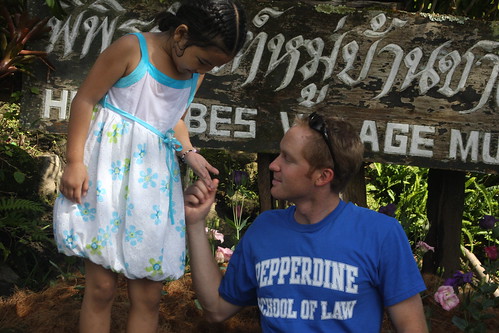Lessons Learned
by Jay Milbrandt (JD/MBA '08),
I once read an interesting interview with Andre Agassi conducted by a young tennis pro. Sitting next to him on an airplane, the question posed to Mr. Agassi was: What is your biggest regret? The answer wasn't a botched backhand or any tennis moment for that matter. Mr. Agassi's immediate response was that he regretted not starting his non-profit organization earlier. His highly-regarded organization serves many children with disabilities.
This statement definitely resonated with me. I recommend to anyone reading this to go out and invest yourself in something that you think needs changing. It doesn't have to be starting a major organization like Andre Agassi—it can be as simple as volunteering somewhere regularly or helping fund education for a few children who can't otherwise go to school. Particularly, if you're a law student, I really recommend taking a summer to work in our international human rights program or taking the youth mentoring class to mentor high schoolers in Los Angeles. No matter what you do, the investment can be highly rewarding.

I think as lawyers and future lawyers, we're in a really good position to do this—particularly when it comes to funding programs. This week, I committed to funding the education of four-year-old Amey. I interviewed Amey's mother this week and she promised me that Amey wouldn't have to sell flowers in the red light district anymore if she could afford to go to school. On Friday night around midnight, I found her down one of the side streets of the red-light district. She was just standing there all alone, holding a bouquet of roses, and mesmerized by the flashing lights. As sad as it makes me to see her there, it's a really good feeling to know we can fix it with just a few hundred dollars each year.
I also learned a lesson about what we can do as lawyers and future lawyers: Sometimes, it's just about showing up. Especially when no one else will show up. Our legal instincts call us to seek justice when we see something unjust. It's not always so simple, particularly when the rule of law fails us. In these instances, simply our presence can be most meaningful.
Throughout the week, I conducted a series of interviews with stateless street families. I was surprised at their willingness. They're stateless: why should they risk telling anyone about their presence, especially with a video camera rolling. Yet, they agreed to the interview unabashedly—and almost seemed honored to have the opportunity to talk about their lives and circumstances. I'm guessing that no one has ever listened to them before. No one has probably cared to ask about their lives, their needs, and their dreams. I think just simply listening means a lot.

Just listening.
There may not always be a simple solution, but listening helps build a framework for solving problems. As one mother told me, "We just need three things: 1) identification, 2) a real home, and 3) a job that can put food on the table." The first thing listed was legal status, even before shelter and food. Maybe Maslow missed something when he created his hierarchy of needs… I really don't remember legal status—essentially being recognized as an existing person—listed in his pyramid. In the opinion of this family, if legal status could be secured, then needs two and three would flow quite easily.
Finally, you never know what you're going to uncover when you listen. In one of my interviews, I picked up on the name of a foreigner who had some involvement with the street kids. Further inquiry revealed that this American man visits the Chiang Mai annually to abuse the kids on my street. No one knew because no one had asked. What I do know is that if you're American and you're abusing children, there are laws that can lock you up. Now we have something to work with.